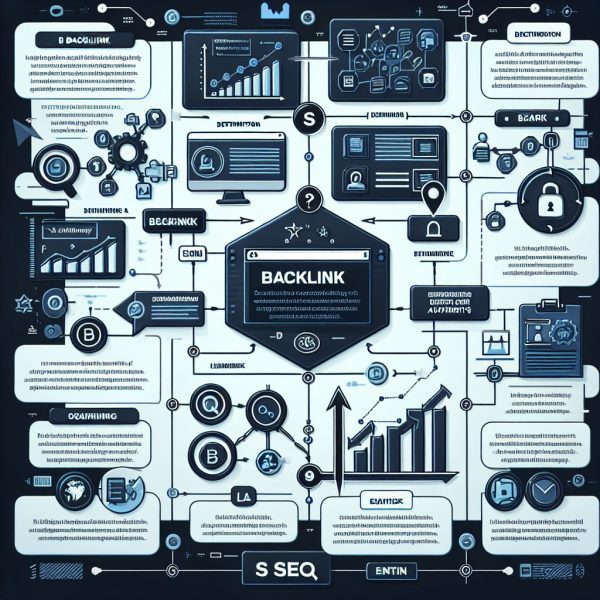You’ve probably heard the word “backlink” thrown around when it comes to SEO, but do you really know what it means and how it impacts your website? In simple terms, a backlink is a link from one website to another. It acts as a vote of confidence and credibility for your site. The more high-quality backlinks you have, the higher your website will rank in search engine results. In this article, we’ll explore the ins and outs of backlinks and their crucial role in boosting your website’s SEO. So, let’s get started!
What is a backlink
Review contents
Definition of backlink
A backlink is a hyperlink that connects one website to another. It is essentially a vote of confidence from one website to another, indicating that the content on the linked-to website is valuable and worth referencing. When a website receives a backlink from another reputable website, search engines see it as a positive signal, helping to boost the ranking and visibility of the linked-to website in search engine results.
Types of backlinks
There are three types of backlinks: natural backlinks, manual backlinks, and self-created backlinks. Each type has its own characteristics and implications for search engine optimization (SEO).
Definition of backlink
Definition of a backlink
A backlink, also known as an inbound link or an incoming link, is a hyperlink on a web page that leads to another website. When a website has multiple backlinks from various high-quality sources, it is considered an indication of the website’s authority and relevance in relation to the linked content.
Importance of backlinks in SEO
Backlinks play a crucial role in SEO. They act as a vote of confidence to search engines, indicating that the linked-to website is trusted and valuable. The number and quality of backlinks a website has can significantly impact its search engine rankings. Google’s algorithms, for instance, place significant weight on backlinks as a ranking factor, considering them as an important measure of a website’s authority and relevance.
Types of backlinks
Natural backlink
Definition of natural backlink
A natural backlink is one that is not artificially influenced or manipulated. It is acquired organically, without any direct effort from the website owner. Natural backlinks are typically earned when other websites find value in the content and voluntarily link to it.
How natural backlinks are acquired
Natural backlinks are acquired through the production of high-quality content that attracts the attention of other website owners and users. When the content is relevant, informative, and valuable, other websites are more likely to reference and link to it. This can happen through citations, guest blogging, social media sharing, or simply discovering the content through organic search.
Benefits of natural backlinks
Natural backlinks are highly valuable in SEO for several reasons. Firstly, they indicate that the content is valuable and worth referencing, which can help improve search engine rankings. Secondly, natural backlinks are typically from reputable and relevant sources, enhancing the website’s credibility and authority. Finally, natural backlinks are less likely to be penalized by search engines, as they are seen as genuine endorsements rather than manipulative tactics.
Manual backlink
Definition of manual backlink
A manual backlink, also known as a built backlink or an acquired backlink, is one that is intentionally created by the website owner or through direct outreach. Manual backlinks are obtained through proactive efforts, such as reaching out to other website owners, submitting guest posts, or participating in industry forums and discussions.
How manual backlinks are acquired
Manual backlinks are acquired through various methods, such as:
- Guest posting: Writing and submitting articles to other websites with a link back to your own website.
- Influencer outreach: Contacting influencers or industry experts to request a backlink or collaboration.
- Participating in forums and communities: Engaging in relevant online communities and including a link to your website when appropriate and relevant.
Pros and cons of manual backlinks
Manual backlinks have both advantages and disadvantages. On the positive side, they allow website owners to actively control and influence their backlink profile, targeting relevant and authoritative websites. Manual backlinks also provide an opportunity for relationship-building and networking within the industry. However, manual backlinks can be time-consuming and require continuous effort. There is also a risk of getting penalized by search engines if the backlinks are obtained through manipulative or spammy tactics.
Self-created backlink
Definition of self-created backlink
A self-created backlink is a type of backlink that is created by the website owner on their own, without external endorsements or authority. This can be done through various methods, such as commenting on blogs, submitting links to directories, or participating in link exchanges.
How self-created backlinks are acquired
Self-created backlinks are acquired through the active efforts of the website owner. They can be obtained by leaving comments on relevant blogs or forums with a link back to the website, submitting the website to directories or bookmarking sites, or exchanging links with other website owners.
Advantages and disadvantages of self-created backlinks
Self-created backlinks have certain advantages, such as giving website owners direct control over their backlink profile. They can be easily obtained without relying on others, providing a quick way to generate backlinks. However, self-created backlinks are generally considered less reliable and valuable compared to natural or manual backlinks. Search engines may view them as low-quality or spammy if they are obtained through manipulative tactics, leading to potential penalties and negative impacts on search engine rankings and website credibility.
How does a backlink affect SEO
Backlinks have a significant impact on SEO, influencing search engine rankings and the overall credibility of a website. Let’s explore the various aspects of how backlinks affect SEO.
Backlinks and search engine rankings
Backlinks play a crucial role in determining search engine rankings. Search engines view backlinks as an indicator of a website’s popularity and authority. Websites with a higher number of quality backlinks from reputable sources tend to rank higher in search engine results pages (SERPs). Backlinks are among the top-ranking factors used by search engines like Google to determine the relevance and authority of a website.
Backlinks and website credibility
Backlinks also contribute to a website’s credibility and trustworthiness. When a website receives backlinks from reputable and relevant sources, it demonstrates to both search engines and users that the website is trustworthy and valuable. Backlinks from authoritative sources can significantly enhance a website’s overall credibility and reputation.
The impact of high-quality backlinks
High-quality backlinks from authoritative websites have a stronger impact on SEO compared to low-quality backlinks. Search engines consider the authority and relevance of the source when evaluating the value of a backlink. Backlinks from reputable websites that are closely related to the content of the linked website are viewed as more valuable and carry more weight in terms of improving search engine rankings.
The danger of low-quality backlinks
Low-quality backlinks can have a negative impact on SEO and the overall visibility of a website. Backlinks from spammy or irrelevant sources can be seen as manipulative tactics to artificially boost search engine rankings. Search engines penalize websites with low-quality backlinks, resulting in a drop in rankings and potentially harming the website’s reputation. It is crucial to regularly monitor and evaluate the quality of backlinks to ensure their positive impact on SEO.
Backlinks and search engine rankings
The role of backlinks in search engine algorithms
Backlinks play a significant role in search engine algorithms, as they are considered one of the key factors in determining a website’s relevance and authority. Search engines analyze the number, quality, and diversity of backlinks to determine the popularity and credibility of a website. Websites with a strong backlink profile are more likely to rank higher in search engine results.
Importance of anchor text in backlinks
Anchor text refers to the clickable words or phrases that contain a hyperlink. It is an important aspect of backlinks, as it provides context and relevance to the linked content. Search engines analyze the anchor text of backlinks to understand the topic and relevance of the linked page. Optimizing anchor text with relevant keywords can help improve search engine rankings and visibility.
Link juice and the authority of referring domains
Link juice refers to the value or authority passed from one website to another through backlinks. When a reputable website with high authority links to another website, it passes on some of its credibility and authority to the linked website. The more high-quality backlinks a website receives from authoritative sources, the more link juice it accumulates, ultimately enhancing its own authority and improving search engine rankings.
Backlinks and website credibility
How backlinks contribute to website credibility
Backlinks contribute significantly to the credibility of a website by providing external validation and endorsements. When reputable and relevant websites link to a website, it signals to search engines and users that the website is trustworthy and valuable. The more high-quality backlinks a website has, the stronger its credibility and reputation.
Relevancy and trustworthiness of backlinks
Backlinks from relevant and trustworthy sources have a greater impact on website credibility. Search engines consider the relevance of the linking website to the content of the linked website. For example, a backlink from a reputable technology website to a website discussing technology-related topics carries more weight and credibility compared to a backlink from an unrelated source.
Evaluating the quality of backlinks
To evaluate the quality of backlinks, several factors should be considered. These include the authority and credibility of the linking domain, the relevance of the linking content to the linked website, the anchor text used, and the overall context in which the backlink is presented. Regular monitoring and analysis of backlinks are necessary to ensure the maintenance of a strong and reputable backlink profile.
The danger of low-quality backlinks
Definition of low-quality backlinks
Low-quality backlinks refer to backlinks that come from spammy, irrelevant, or untrustworthy sources. These backlinks are usually obtained through manipulative tactics, including link farms, paid link schemes, or excessive link exchanges. Low-quality backlinks can harm a website’s SEO efforts and credibility.
Negative effects of low-quality backlinks
Low-quality backlinks can have several negative effects on a website’s SEO. Firstly, search engines may view these backlinks as manipulative and penalize the website accordingly. This can result in significant drops in search engine rankings and visibility. Additionally, low-quality backlinks can harm a website’s reputation, as users may perceive it as unreliable or untrustworthy if it is associated with spammy or irrelevant sources.
Identifying and removing low-quality backlinks
Regularly monitoring and identifying low-quality backlinks is essential for maintaining a strong backlink profile. Webmasters can use various tools and techniques to identify and analyze the quality of backlinks, such as Google Search Console, Ahrefs, or Moz’s Open Site Explorer. Once identified, low-quality backlinks should be removed or disavowed to prevent any negative impact on search engine rankings and website credibility.




























